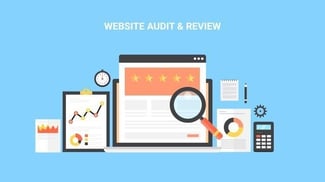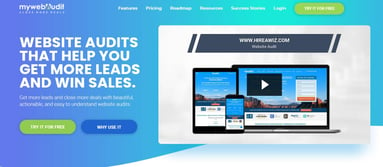How to choose a website developer

Finding the right person or team to develop your website can be tough, right? There are so many to choose from, and it can be hard to know who to trust your investment with.
In this post I’m going to share an original, and very effective, way to assess a website developer before spending any money or time with them.
It’s a bit of a non-traditional approach, and I doubt that I would have come up with this if I wasn’t in the industry myself.
But before I do, I want to share the reason why it’s so important that you conduct some due diligence before investing in a website, and why you can’t just assume the best even if someone has experience and a portfolio.
Why it's important to do your due diligence when looking for a website developer
One of the problems that small business owners face is that the industry of website development is not regulated in anyway, so there are no overarching standards that you can be confident will be met. There’s no safety-rail that allows you to say “hey, that’s not good enough”, because “good enough” has never been defined.
Furthermore, thanks to the advances in website development technology over the past decade, the barriers to entry for website “professional” have never been lower. Quite literally, anyone can claim to be a website developer, and yes, they probably could provide you with some form of a website for your money.
I spoke with someone recently that described receiving three quotes for when he had his website developed. One was $20,000, one was $2,000, and one was $200. He was totally surprised and confused; how could the same thing vary in price by so much? With nothing else to go on, he chose the mid-range quote, and thankfully the outcome was positive, but he was essentially taking a best-guess that was based on price which is risky for all sorts of reasons.
All these challenges highlight the need for thorough due diligence prior to hiring a developer.
But then the challenge is knowing how to do this.
Three ways to test a website developer
By following these steps you’ll be able to quickly and confidently make a good decision about your website developer.
Keep in mind that a website is a business tool. Sure, it should look great and be easy to use, but it also needs to compliment the business.
1. Scrutinise their website
 By looking at your website developers website you might be able to quickly screen them out. But you'll need to do more to be confident that they are the right fit for your business. After all, you can’t know for sure that they developed it themselves, or how long it took them.
By looking at your website developers website you might be able to quickly screen them out. But you'll need to do more to be confident that they are the right fit for your business. After all, you can’t know for sure that they developed it themselves, or how long it took them.
However, in the ideal scenario, their own website should stand as an exemplar for what a high-quality website looks like.
It should meet all the usual stuff like:
- Look great on mobile
- Be served over a secure connection (padlock icon in browser address bar)
- Load quickly and be easy to navigate
- Be well-designed and branded
But it needs to do more than just great. It must serve its purpose well.
Ask yourself:
Does their website make you feel like their service is perfectly suited for you? Or not?
You should feel confident about how relevant their service is for you. Are you their ideal customer or not? The answer should be abundantly clear.
If you can’t answer this immediately, then they have failed to connect their customer (you) with their value (their website), which is a sure sign that you should look elsewhere.
However, if it looks great and feels relevant, then move on to the next step to really put their skills and perspective to the test.
2. Ask for a website audit
 This method involves asking for a website audit of your current website, or of a competitors website. Whatever you choose, the website should be good enough to put the developer to the test - you won’t learn much if there are lots of obvious problems on the website.
This method involves asking for a website audit of your current website, or of a competitors website. Whatever you choose, the website should be good enough to put the developer to the test - you won’t learn much if there are lots of obvious problems on the website.
The way in which the website developer audits the website will reveal many characteristics about their priorities, beliefs, and their values. Ultimately, how they do the audit will provide authentic insight into the way in which they will work and treat your project.
What I like about this method is that it re-purposes the sales tool, and takes the power of it from the website developer, and places it into your hands. This is not the way a website audit is usually used, and because of this, it will provide authentic insights.
Here’s what to watch out for:
- The audit should focus on business-relevant factors, not technical details.
After all, a website is a business tool. It exists to serve the business. The audit may include necessary technical aspects for things like speed, usability and performance, however, the most important thing is that the website provides the business with value. Technology comes second, not first.
A good website audit will cover things like:
- The value proposition, or unique sales proposition
- Customer pains, or desires, or relevance
- Customer identity, segments or profiles
- Branding, positioning, or promotion
- Lead acquisition or conversion method
- It should be easy to understand
Perhaps most importantly, the audit should be easy to understand and provide valuable insights. The audit is for you, so if you can't understand it, then the developer essentially hasn't provided you with what you wanted.
Keep in mind that the website audit is a sales tool for many website developers. Cloud applications like www.mywebaudit.com provide web developers with automated audit tools with the promise of improving their sales.
 While these types of audits can provide great information, they also tend to provide far too much technical information that can quickly bamboozle the average business owner.
While these types of audits can provide great information, they also tend to provide far too much technical information that can quickly bamboozle the average business owner.
These overly-thorough website audits will always reveal a huge number of potential improvements which place the developer in the prime position to leverage these to their own advantage. Without putting these in context of the business, the business owner is left defenseless to the developer that is looking to close the sale.
If it feels like you don’t fully understand the audit, and that you may be driven by a sense of fear to make a rash decision, then it’s a sure sign that the developer holds their own interests above yours.
- Promises for conversions should be absent, minimal or conservative
At some point, usually, immediately after the audit, a developer may send you a pitch or a proposal. Again this should prioritise business value above all other considerations.
Fortunately, most developers get this part right. However, watch out for promises about increasing conversion rates by some percentage as a direct result of the website rebuild, thereby justifying the cost of the website build.
These predictions make for great sales tools, but they aren’t valid. It’s virtually impossible to make a prediction like this with the little information the developer has at hand.
 Making a prediction like this highlights the lack of true understanding on conversion optimisation and indicates the developers willingness to apply a one-size-fits-all approach to their clients.
Making a prediction like this highlights the lack of true understanding on conversion optimisation and indicates the developers willingness to apply a one-size-fits-all approach to their clients.
On the other hand, a business-savvy developer should be able to speak to improvements in conversions through strategies that are relevant to the business, that are monitored, measured, and adapted over time, to systematically improve the conversion performance of the website.
Use their audit and their pitch to detect if you are being served a genuine strategy that will help your business growth, or a generic sales pitch that will help fill their pockets.
If you like what you see so far, then arrange a chat and come prepared ask the right questions.
3. Interview your developer

Asking the right questions will help fill any gaps of uncertainty for your website.
Assuming that you’ve done the above, I’d suggest asking the following questions:
- How long will it take to develop?
- What happens if development is delayed more than this? (Ensure they are confident and willing to back up their promise)
- Will I be able to make changes to the website myself once it's live?
- What support is provided free, and what would I have to pay for?
- Will we be able to easily add new features in the future (ask about a few specific examples that are relevant for your business)
- Do you provide ongoing maintenance and updates to keep the website up to date?
- What security measures do you provide?
- What happens if the website goes offline?
- What happens if the website is damaged, loses data or erased?
- Will I be able to move my website to a different host in the future?
- What information will you need from me to develop the website?
- How much is it likely to cost me?
Of course, keep in mind that there is no consistency in the industry for website pricing. Some individuals price by marking-up their costs, others price more strategically to reflect brand perception. Before you compare prices, take the time to consider their pricing strategy, as a more expensive website may not be any better than a cheaper one.
TAGS: